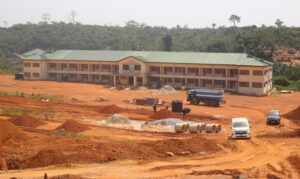The cost of constructing a 4.6-kilometre access road for Anomabo Fisheries College in the Central Region has increased by 237.5 percent – from an initial cost of about GH¢8million to approximately GH¢27million due to three successive variations.
The road project spans the Fisheries College site to the main road, made up of 0.63 km internal and 4 km access roads from the Nsanfo Junction (Accra-Cape Coast Highway).
The significant rise in cost is attributed to delays in disbursing funds to the contractor. According to a director of the construction firm working on the project, who pleaded anonymity, the late release of funds to contractors remains a significant obstacle. “Some of these things are just about money; if monies are released in a timely manner, almost all projects would be completed on time. So, our main challenge is with payment.”
He however said some firm assurances have now been given to ensure timely release of funds and enable ongoing works to be completed as soon as possible.
Speaking during a visit to the project site by members of the Public Interest and Accountability Committee (PIAC), he noted that the earthworks are about 60 percent complete. The next phase, he added, will be applying bitumen to what has been done.
He explained that the roadworks began in 2019 and have undergone three variations, leading to the current surge in project cost. Explaining further, he said: “When we started this project, the cost of iron rods was just about GH¢2,500; but currently we are buying the same thing for GH¢7,500”.

The focus on completing the on-site road as part of phase-one activities (sub-base), he said, is due to the aim of commencing educational activities at the campus some time in 2024.
During the latest project inspection, the Committee took note of a teachers’ bungalow construction, but noted that the hostel and 18-unit classroom block facilities have not been fitted with beds and study desks.
Additionally, the classroom block and hostel facility are showing signs of structural defects, with air-conditioning at the administrative block fitted and left without security at the site.
Technical Manager-PIAC, Mr. Mark Agymang, in reaction to developments during the inspection stated that most government projects awarded across the country experience cost overruns due to funding delays.
He said: “PIAC has consistently visited the Anomabo Fisheries College project, and if there had been full commitment to this project it would be completed by now. Some of this back and forth is what causes the delays and associated cost overruns”.
While recognising that the surge in cost of the project is a worry, he noted this has been the trend since 2011 for ABFA funds applied to projects. “ABFA is paid quarterly per lifting, so why is funding not going to projects? And what are the other funding sources of these projects?”
On state of the project, he said its stalling as well as low-quality materials are major causes of defects seen on some facilities at the project site.
Construction of the Fisheries College project, located in the Mfantseman municipality of the Central Region, started in 2011 and received an amount of GH¢9.5million from the Annual Budget Funding Amount (ABFA) between 2012 and 2022.
Although the project initially had an 18-month completion schedule with four contractors involved, years later it remains incomplete and non-functional.
Government had made assurances to complete critical components of the project to operationalise it for the 2020/2021 academic year. This was part of government’s vision to strengthen the fishing and aquaculture industry with the help of infrastructure such as landing sites, fish hatcheries, health laboratories and training centres.
The Minister of Fisheries and Aquaculture Development, Mavis Hawa Koomson, in 2022 said her ministry was working with the University of Cape Coast (UCC) to operationalise the Anomabo Fisheries College and admit students for the 2022/2023 academic year.
Answering questions on the floor of parliament, the minister said the ministry had initiated the necessary activities toward furnishing the blocks, as well as equipping the laboratory.
“This year, the ministry will start construction of the principal and staff bungalows. The ministry is working with the University of Cape Coast to operationalise the institution and admit students for the 2022/2023 academic year,” she stated.
In a related development, the Committee members paid a brief courtesy call on the Chief Executive of Mfantseman Municipal Assembly, Ike Lord Ennu.
During discussions with the MCE, he enumerated the challenges he has encountered while trying to acquaint himself with the projects awarded directly from central government.
Against this backdrop, he entreated PIAC to also focus on those who contracts have been given to be executed, and hold them to task for delays. He therefore suggested a need to ensure contractors are not given multiple projects, since there is a tendency for some funds to be diverted and spread among them.
The Committee members included Nana Kwaku Dei II, also known as Ransford Tetteh, representing the Ghana Journalists Association (GJA); Nana Yaa Ansua, representing the Queen Mothers Association; and Mr. Constantine K.M. Kudzedzi, representing the Ghana Bar Association (GBA).










